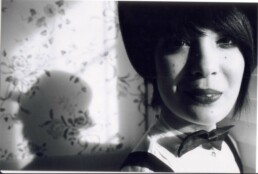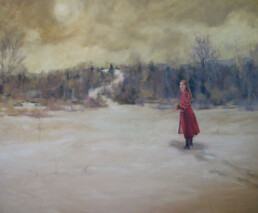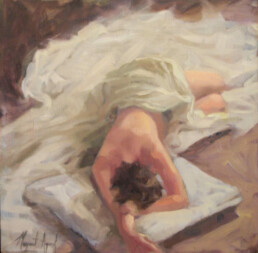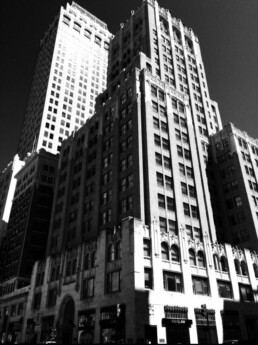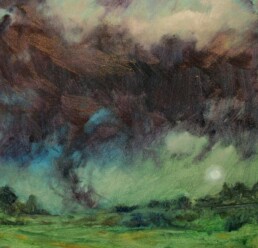On Being Ex Best Friends from a Girl Made from Metaphors
by Jenna Buschmann
Fuck, I wish this wasn’t nonfiction. I wish that this was some made-up person’s story. I wish that I was some character sketched up out of nowhere living a make believe life with make believe people whose problems were just stains on a page. But that’s not the case. This is real. Even worse, I’m real.
She was my best friend. She was there with me as I stepped off the stage during my kindergarten graduation and she was there in the crowd when I did it again, twelve years later. When people asked about her, I called her Daisy Buchanan. Because she was beautifully tragic, with confusion and indecision hanging over her like cherry blossoms. I had grown up with her fused to my hip. Our tears, our sweat, our blood were all mingled together, mixed and blended so much that we were confused to be the same person. Our subtle differences, my paleness and her freckles, my curls and her waves, went unnoticed and people saw us as one being. I wouldn’t be surprised if someone took me apart, bone by bone, and found her name carved in the marrow.
We became neighboring tombstones last summer. The masks of youth were ripped away as the loves that lasted throughout our adolescence crumbled to nothing. Both of us had our hearts ripped out and put in jars that became dusty over time. Both of us found ourselves with pill bottles in our shaky fists and red etched across our arms. We wrote love letters on the back of prescriptions. But in our free hands, we held on to each other. At least I thought so.
Thirteen years puked out and flushed down. Thirteen years burned up and snuffed out in ashtrays in houses we shouldn’t have been in. Thirteen years tossed away with condom wrappers and thirteen years swallowed whole with two sugars and cream. We outgrew each other, people would say. But I’m still here. Wherever here even is. And she’s out there, in his arms, surrounded by the skeletons from my closet, gibbering in a language I can’t hear.
She started to romance out of desperation, a deadly combination for a girl made out of china glass and Zoloft. He appeared from the shadows of my past, the dust of my high school years, and offered her his hand. He was a boy that had breached my social circles for years and he played the same charade every time. He was charm and money, dollar signs behind his thick expensive frames.But after time, the ruse wore away to reveal the horns hidden by perfectly windswept hair. The twist in his cruel smile peeked out from beneath his meticulously curled mustache. I warned her. I said don’t please don’t, because I knew him--I’ve seen his fangs before. But she did what she does best. She pretended.
So he hit her and shattered her porcelain skin into ruin. So he took her and left her with nothing but hollow insides. She would brush it aside, along with the inhibitions she had, and say it was her fault. That she brought this upon herself. She would douse out the fires of anger in her belly by telling herself that,in some way, she was worthy of being worthless. She would come to me, her eyes a cornflower blue with no starlight behind them, and the words she said tinkled like music box notes. Jarred, distant, and flat. I was in love with a girl who was a ghost. She was in love with tragedy, wine coolers, and shadows.
One day she broke. The cracks in her skin a little too big to hide anymore. She wept to me till snot slid down her face and her tears left trails in her makeup. She cried to me until her breath refused to come. So I told them. The people who knew us both, who had seen our blooming and wilting. I stretched out my hands to them, a beggar woman, pleading for them to help her. I removed the mask hiding the monster. I showed them who her romancer really was.
It was a crowd of fools who heard my cries. An audience of the deaf, staring blankly as I screamed for them. College friends who I had spilled out my insides to. Childhood friends who knew my DNA as well as their own. But they plugged up their ears with wax; I the siren, they the sailors. I was treacherous. Because believing a myth is better than swallowing a bitter-tasting truth.
She picked him. Aghast at my audacity, disgusted with my desperation, she chose him. She turned away from me, our matching tattoo hidden under sweaters that also hid the bruises blossoming on her arms. She turned away from me, away from the Polaroids pinned on bulletin boards. (Her and I dressed up as princesses toasting with orange juice in our stemmed glasses. Her and I with braces and babydolls on a walk. Her and I in photo booths across the country. The same two smiles in different lighting. The same two grins with different backdrops.) Away from the campfires of sleepovers spanning a decade. (Her and I cuddled up watching Norwegian horror flicks. Her and I making shitty sculptures out of modeling clay at one a.m. Her and I driving to camp in cemeteries and smoke cigars in comfortable silence.) Away from the postcards sent across the sea and back. (Her from France. Me from Chicago. Her from Scotland. Me from Alabama.)She turned away from all of that and took the hand of the devil because at least the devil is quiet when things get uncomfortable.
I saw her yesterday, in my place of work, walking the aisles of my retail store like a phantom. She had flowers in her hair, colorful little fake things tucked inside the gold of her curls. She wore that same predictable sweater she always wears, the one with the color that is so bland it doesn’t have a name. Her little employee badge pinned and sagging so that I couldn't even see the letters. I ran to her, my body’s synapses having a mind of their own. Having her near me is something buried deep into my muscle memory. I pulled her to me, feeling the smoothness of her beneath my tattooed arms. She hugged me back, tightly, maybe checking to see if I was just as fragile as she was. My mouth opened without my permission and my secrets slid out before I could catch them and shove them back into my chest.
“I miss you I miss you I miss you.”
She did what she does best. She pretended. The blue of her eyes was a wallpaper to an empty room. Her white teeth little fences to her smile. She tried to patch up the holes I ripped with my clumsy feelings. She tried to sew up all the tears and holes I tore open. But I knew that one hand was patting me, saying things are okay, while the other hand clung to his cloven hoof.
And I know that I’m going to let her go. Because losing people has come to me as an art now. I can do it with my eyes closed and my hands tied behind my back. I can shut down my organs one by one. She’s seen me do it a thousand times to a blurred line of different faces. Like her, I excel at pretending. While she pretends to care and nurture, perfecting the worried glance of a mother, I’ve been doing a solo act. It goes like this: Turning away, smirking about the fickleness of feelings, and then giving out my shortest, crispest, meanest laugh to punctuate the end of it all. The lines come naturally, “I don’t need you.” But that’s only when I need lines in the first place.
It’s hard to replace her. It’s hard to fill up the entire galaxy she left behind with stars that can’t shine as bright as she did. But she’s just like that, you know? A star. I can look up in the blackness and see her, brilliantly burning above me. Yet in that inky black, light years away from me, she’s dead. Faded into a memory that I mistake for reality. A shell of a sun, haunting the atmosphere, waltzing between the planets and orbiting around me.
But she’s not even that. You can romanticize her as much as you want. Actually, she would love that. My Daisy. Always tragically romantic. She’s not a metaphor, she’s not an enigma, no matter how hard she tries to be. Every about her is measured to a tee so you can’t see the darkness lurking beneath. The darkness that I have known and embraced. It would Skype me when she was away at college and call me when she was alone. The darkness would be in her fingertip pushing at the back of her throat until she vomited her charisma away. The darkness was in razor blades she would tuck in her purse to cut away at the parts she didn’t like. The darkness was the lock in her door, the darkness was the silence on her lips. Like I said, this isn’t some short story about a girl I wove from fiction. This is my life and hers. All fact no fabrication.
The truth of the matter is, the cold hard truth, is that she’s this fucked up teenage girl who left me for an abusive asshole. She’s this screwed up young woman who can’t listen to reason because she’s too terrified of being alone. She was my best friend, and is the closest thing I can ever have to a soul mate, and she is tremendously and magnificently imperfect. She is a girl who pretends to be everything she is not, and the fact that I can see beyond her carefully crafted disguise makes her push me away until I am light-years away from her and her problems. And I am this stubborn, cold, and blunt girl. I am the person who can’t sit and watch. I am the person with so many raw emotions that even strangers know when I’m upset. I am the girl that can easily be described as an asshole and a bitch, because I can’t let things slide. So I didn’t. And because of that, she left me behind, back here on Earth as she floats on to places where people like me don’t exist.
The Audition
by Becky Eagleton
“Your name?”
“Cicero.”
“Like the Roman?”
He blinked. “Jones. This is my first time.”
“You’ll be fine.” I turned to Tricia at the piano. “You have his music?” She shrugged.
“I’m singing my own stuff,” Cicero said. “A song I made up.”
“A capella, then.”
Cicero frowned. “No, you make me bleed.”
“Pardon?”
“It’s You Make Me Bleed. Name of my song.”
Larry kicked me under the table. I kicked him back.
“Whenever you’re ready,” I said to Cicero and smiled. Cicero untied the rolled bandana that served as his belt, hitched up his blue jeans closer to his armpits and re-knotted the bandana. He was that thin. Skeletal nearly. He cleared his throat, opened his tiny hole of a mouth, and emitted a squeak.
“Can I start over?”
“Sure,” I said. Cicero nodded and took three giant strides backwards, Mother-May-I style, and put his hands on top of his head. He resembled a grasshopper.
I steeled myself.
Still holding his head, as if he might float away without the pressure of his hands, Cicero began a series of grunts, moans, sighs and quiet howls that, even run all together, could not be forced into a known rhythm or recognizable Western melodic form. Or Eastern, for that matter. Larry kicked me again, and then excused himself from the room. Cicero continued, his face pale, the overhead fluorescent light glinting off the quivering brown stubble on his chin. The words slipped from his thin lips without benefit of consonants, and his song, though probably written in the English language, was presently unknowable. I glanced at Tricia, who had been invaded by aliens, by the uncharacteristically slack-jawed look of her.
Cicero cut off his voice mid-shriek and lowered his arms.
“Done,” he said.
“Right.” I swallowed. “Did you bring a monologue?”
“Don’ know about that, but I got something I wrote,” he said.
“Of course.”
“It’s a play,” he said.
“And this is a monologue, from the play?”
“It’s the part where the two lovers are talking and get in a fight. Well, one’s dead so it’s her ghost. I’m doin’ both parts.”
“I see,” I said. “Cicero, is this long? Because I need to limit you to a minute – we have twenty more people waiting.” I pleaded with my eyes, my shoulders, even my hips, though he couldn’t see them under the table where they’d been spreading and protesting the hard metal chair for over two hours of auditions now.
He ran his large bony hand through his stringy hair and paced. “Well, I guess I could do, you know, like the last part.” He stopped and rolled his eyes, looked around the room as if searching for something essential. I was not hopeful it was the exit sign. He resumed his pacing.
“You don’t make it easy,” he muttered and then quickly turned, rushed to the wall, and grabbed a music stand. Dragged it back to the center of the room. Larry stuck his head in the door, and I locked eyes with him, sent him a clear SOS. He smiled and gave me a little finger wave before leaving again. I glanced at Tricia, who had crossed her arms over her plump middle and regained her human qualities. She winked at me. I was going to have to make a few phone calls and see if I could bring in some professionals to handle the lead roles. There was no one here I could begin to mold, let alone present in a production where people were paying for their tickets.
“Ready?” I asked, as Cicero moved the stand another six inches to the right and then back again to the left. He pointed at it.
“This here’s the tombstone. When I’m in the grave, I’m the girl, okay?”
“I’ll figure it out,” I said.
Cicero lay in front of the stand, the soles of his mud-covered boots facing me. He crossed his arms on his chest. I could see up his nose. His nostrils were large and dark, like caves. He sat up suddenly.
“I need a rose!”
“A real rose?”
He nodded.
“Please, just pantomime it.” His panicked face did not change expression. “Pretend. Play act.” I said and pinched my thumb and forefinger together and sniffed the air above them. “See?”
“Won’t be the same,” he said and flopped down. I knew I wouldn’t be the same.
“Wait!” he said and jumped up, pulled something from his back pocket and placed it on the music stand, then lay down again. I could not be certain, but the slender gray object, about the size of a cooking spoon handle, looked like a bone.
That was interesting.
Cicero began his play, and I found his audition sheet with his vital statistics. Listening to him, I surmised at sometime in his career at Kansas County High School, he’d been exposed to Romeo and Juliet because he was laying out his own tragic version for me, there in the Kansas County Community College band room – the auditorium being reserved for Miss Dicki’s Dance recital.
But I stopped listening to Cicero when he stood, grabbed the bone and held it over the grave, like a flower he would toss. It was obviously a bone, an animal bone I hoped, though frankly I wasn’t positive. One end was broken and I thought I could see blood, or something dark brown. What color was marrow? Cicero lay down again and placed the bone on his chest, crossed his hands over it. All the time he droned on and on, the lines as bereft of consonants, and therefore meaning, as his song had been. But I was mesmerized by the slender bone. Possibly a leg bone, from a rabbit. No, larger. A small dog. Cicero handled it lovingly, as if he’d carved it from the muscle himself.
At the piano, Tricia cleared her throat. She tapped her watch face and raised an eyebrow.
“Cicero--,” I warned.
“Ain’t done!” he whined.
“Minute’s up,” I said staring at the bone. “I’m sorry.”
Cicero huffed towards the door.
“Just a minute!” I cried. He turned with a jubilant face and sprinted over to the table.
“Is that a… bone?” I asked.
He stared at me, and then comprehension seeped into his features. “Oh. Yeah.” He placed the bone on my stack of audition forms.
I stared at it. “Why? I mean, in your pocket? A bone?”
“You can have it.”
I squinted. “Where did it come from?”
“Fell outta the sky. As I was walking in the building. Nearly hit me on the head.” He slid his skinny rump onto the table. “Do I get the part?”
“It fell out of the sky,” I said and glanced at Tricia who sat nodding, as if she herself had picked up a smooth tibia from the ground on her way in. She was going to pull one from her handbag any minute.
“I got plenty more,” Cicero declared and nudged the bone towards me with his finger. “Hawks drop ‘em.”
“Excuse me. Wait a minute.” I inhaled. “You’re telling me that you’ve had other bones fall… out of the sky? And land at your feet?”
“Well, sure.”
Me, with my hard-earned four years of college and two years of Masters degree and my traveling Artist-in-Residencies—I’d never been the recipient of a bone from the clouds. I eyed Cicero and then the bone while strains of bluegrass drifted in from the recital next door. I pictured my hotel room whose windows overlooked the Wal-Mart. My room was neat, neat as a pin. Everything I owned nearly could fit in the battered duffel I stowed in the closet behind the complimentary ironing board.
Right then, I felt everything I knew could probably fit in that duffel as well.
Out of the hundreds of people I’d auditioned over the last few years on my grant, Cicero was the very worst. Truly the bottom of the barrel. I thought I should ask for more money. Maybe add a hardship clause to my contract.
But that bone.
Cicero jumped from the table and grinned at me through small, yellow teeth. “Do I get the part?”
“Exactly what part do you want?” I picked up the bone that had once been in a hawk’s talons and felt an overwhelming desire to smell it.
“Don’ know. What parts are there?”
I sat back, pointed the bone at his horsey face. “Are you familiar with this musical? The King and I?”
“Uh, think mebbe I seen parts of—like on MTV.”
Larry traipsed through the door. “We’re running out of ti-ime,” he sang, “and I still have to dance, everybody.” He executed a single pirouette and skipped back out.
Larry may have been the hired choreographer from Chicago, but he wasn’t holding a skeleton piece meteored from the heavens. Further, what was his rush? We’d not seen one competent auditioner so far, and I had my doubts about the remaining twenty, kicking their heels in the hall. Time was something I would have in spades for the next six weeks. Talent was what I needed.
I touched the bone to the back of Cicero’s hand.
“The King and I is about a clash of cultures, one man’s desire to move his society forward. The female lead is a teacher, an outsider, who is appalled by the traditions of the King’s country, yet determined to teach them her ways … as she learns theirs.”
“Uh huh,” Cicero said. “I could be the King!” He ripped the bone from my hand. “Like I’d have this crown and a big, you know,” he said punching the bone in the air, “ruling stick!”
“A scepter.”
“’Cept what? I could do it!”
I panicked and thought he might keep his gift to me, of the bone. I held out my hand for it. He froze, and I should have been more casual because an understanding, and a cunning, I have to admit, crept into his eyes. Cicero was a different animal now, with his new knowledge of the depth of my desire.
He lightly tapped the bone in his palm. “It’s like you, coming here,” he said, and held out the bone just inches from my reach. To get it, I’d have to stretch over the tabletop, and I wasn’t ready to play my hand. I tilted my head back and looked at him from under my glasses.
“What about me?” I asked, cool as a cucumber.
Again, Larry waltzed in. “I’m taking lunch,” he declared and stomped out. Cicero gave a gummy smile and moved the bone closer. I cautiously took one end, and he held the other.
“Like that lady teacher, in the musical, wantin’ to change things,” he said, “but, like, gettin’ changed herself.”
He released the bone to my grip but I still felt the weight of him, there on the other side of that table. The weight of Cicero and Susie and Norman and all the others waiting in the hall, desiring to sing and dance of a far off country. Wanting to leave their boots, their fields, their barns and twirl in bright colored costumes on the glowing stage, in front of an expectant and admiring crowd. To momentarily be someone else.
I slipped the bone into my lap. Cicero opened his meager mouth, but I cut him off.
“You got the part,” I said.
He whooped, a loud bray that startled Tricia off her piano bench.
“Cicero,” I called as he jumped and cavorted towards the exit. “Tell them. Tell the ones waiting. Everybody gets a part.”
I took the bone from my lap and pointed it at Tricia. “Take lunch,” I told her.
“I brought a sandwich,” she said and pulled a plastic sack from her purse. “I can split it…”
But I was going out for a walk with my bone. In the field next to the parking lot. I’d be watching the sky, hoping to get a part.
Cigarettes
by Meagan Hancock
She found kissing him like smoking cigarettes;
Regret filling each breath he took away.
Every kiss was another hit, she swore would be the last.
But he’d cast his net. She was addicted
To the burning sensation he left on her lips;
That spread to her body like wild fire.
Desire made it hard to say no.
No reason why, he only left destruction.
He said it was cool.
Pressing against her lips again.
She was all tension,
But here was the release.
And that was all fine until the pack was empty.
Apology
by Ashley Sorrell
Today I was thinking of you
My hands got sweaty
And heart dropped heavy
The feeling of regret
From last summer’s affair
Emanating from my sad soul
Coming into your life
Like a whirlwind
Dancing ‘round town together
You seemed to truly adore
Just as our hearts
Were joining our eyes
I ripped the rug
From right under our play
Leaving you dizzy, alone
Cutting off connections
I love to build walls
Dragon Breath Nights
by Brandie McAllister
The neon sign in the window of the liquor store switches off just as he steps from the curb.
The brown paper bag clutched in his fist is wrinkled as a turkey neck. Even through the rearview mirror, I can tell the weight of the bag by the way he handles it, his calloused knuckles white, wrapped around more than just one bottle. His other hand is busy lighting the end of a cigarette, which dangles crookedly from the corner of his mouth. The already hawkish features of his face collect elongated shadows and his greasy hair shines a greenish yellow beneath the fluorescent dawn of the streetlamps. He’s a skeleton in skinny jeans.
The night has become our morning. We’ve lived by the lights of the city—the streetlights and stoplights, the neon signs in bars and strip joints and pawnshops and convenience stores like this one—for almost a year now. Tonight, the whoosh of the wind funneling through the alleyways of the promenade sounds like the flush of a toilet. The sound of endless opportunities and bright futures going down the drain.
I jam my finger down on one of the buttons on the car radio, cutting off Barbara Lewis mid-verse, before he slides into the driver’s seat. His door creaks open and he stoops into the car’s cracked leather interior, tossing the heavy bag into my empty hands.
“I got your favorite,” his voice rumbles and his dry lips part into a snaggletoothed grin.
Jim has a face like strawberry jam—his cheeks all pocked and ruddy from ancient acne scars. He removes a square-shouldered bottle from the bag. Filtered through green glass, the clear liquor is the color of mint-flavored mouthwash.
“Schnapps,” I say.
“Don’t I get a thank you?” he asks, brandishing his own bottle, a flask-shaped jug of some high-proof off-brand whiskey.
“Thanks,” I say.
I hate drinking. But I hate listening to him talk more. On nights like this, when he has too much, which is most nights, he’ll chase his malt with longwinded spiels, the topics wide and dull. But because his verbal battles are unwinnable, I’m self-taught in the art of strayed attention and by the time the schnapps are half gone, his voice has faded to an indiscernible roar. The heady alcohol knows just how to silence my mind. His hot words bathe my face in a fiery discourse, his dragon breath a cloud of soured smoke and milky moonbeams. But these nights are better than the nights when he doesn’t drink enough.
It’s not until he touches the blazing end of his cigarette to my inner thigh that I realize he’s been saying my name. I gasp and recoil, slapping his hand away and knocking the stub to the floor.
“Asshole,” I hiss, brushing the ashes from my leg.
“Oh, come on,” he rasps, his words floating somewhere at the opposite end of a long tunnel. “You know I love you,” he adds, retrieving the cigarette from the floorboard and tossing it out the open window.
I glance at him sideways, my vision losing focus as I take another swig from the schnapps.
“Look at me,” he says.
I keep my eyes trained on the young couple sitting on the sidewalk across the street.
“Look at me,” he orders, clamping a hand around the back of my neck and swiveling my head around like a stiff Barbie.
I lean my cheek into his caress, rolling my eyes in his direction. His tongue idly traces the dip in his lip where ten thousand cigarettes have cut a shallow valley.
Then he says, “Why don’t you go get us some condoms.” The words themselves are a request, but he doesn’t say or mean them like one.
Jim releases me and lifts himself off the seat, retrieving his wallet and digging out a ten. He waves it like a tiny flag in front of my face. I attempt to snatch the bill from between his pinched fingers once or twice before I’m successful, not meeting his eyes. Sandwiching the schnapps between the seat and center console, I look down at my feet. We left my sneakers in the motel when the super realized the credit card we’d used was stolen. He said if we didn’t want the police involved to make like roaches and scatter, so we did.
I climb out of the car and my feet touch the cool cement. I take a deep breath, grateful for air not saturated with the stink of his cat piss spirits.
“Hey, and get the ones I like,” Jim hollers out the window. “None of that latex shit. And some energy shots.”
I make no sign of acknowledgement; I know how much it irritates him.
Across the lot from the desolate liquor store is a rundown Conoco, the registers inside manned by a two-person crew.
The couple I’ve been watching, a boy and girl, maybe sixteen or a little older, sit pretzel-limbed on the weed-choked sidewalk outside in front of the ice machine, their spines kinked like drooping dandelions. Their faces glow, ghostlike, in the severe white of the station’s industrial lighting. I pretend to focus on my fingernails, the dark polish chipped around the edges, but can’t avert my eyes from them as the boy plucks a bent flower from the crack in the pavement and tucks the delicate stem, and a stray lock of pink-streaked hair, behind the girl’s ear. His touch seems gentle and the top of my ear itches—
A loud pop, almost like gunfire, explodes from inside the gas station. I look up. Through the storefront windows, the metallic glint of a small black pistol winks under the harsh troffer lights. I freeze; my eyes locked on the hooded figure holding the gun, as the couple springs to their feet and scatters, the rapid scraping of their sneakers on the asphalt the only sound in the night. They’ve disappeared around the side of the building before my brain can process what’s happening. Inside, the shooter slams a backpack onto the counter next to the register and barks orders at the cashier who’s still standing. His shouting is muted by the glass doors between us.
Jim is out of the car now, the glowing embers of his Parliament drifting to the wet macadam like drunken fireflies dropping dead in the air. He’s standing behind the driver’s side door, raising his voice at me, the syllables of my unfamiliar name dripping from his tongue like acid. But my mind is misplaced, out of sync with my body, like a dream where life moves in normal speed, but everything I do is in slow motion. I’m still standing in the same spot, stone-faced, when the man—in his late thirties maybe, sporting three days’ worth of scruff and tattered Nikes—emerges from the mouth of the station. His eyes are bloodshot and wild. They dart from me to Jim, who’s moved to just inside the limit of my peripheral vision, then he turns his back on us and pounds his sneakers into the pavement.
“Stop!” Jim shouts.
Flyaway paper tumbles out of the man’s pack, catching the wind and drifting down the street, mingling with dried leaves. He doesn’t stop for them.
“I saw your face!” Jim yells.
With the wide arc of an oscillating sprinkler, the man raised his gun and two more cracks of thunder split apart the night. The man’s shapeless form, clothed in loose jeans and an oversized t-shirt, slips away, gradually blending into the environment. I force my eyes away and turn around.
Jim is spread-eagle on the dark asphalt, his bare chest spattered with a spray of red like wine on white carpet. His face, a tiny moon in the darkness, is sallow and shadowed in places, his dimpled cheeks deep and sunken in.
Just ahead, the wailing of two crazed voices echoes against the building. I glance up to see two men crossing the lot. One of them is on his cellphone, his free hand tangled in his windswept hair, the guy behind him is hollering, his misty eyes growing wider with each step that brings him closer to us.
“Holy fuck!” he whimpers, a broken cry escaping his lips at the sight of the dead man. “Holy fuck, he’s dead…” The last word curls up at the end, like a spider’s legs upon its death.
While the guy on the phone keeps a safe distance between himself and us, trying to piece together his disjointed sentences, the other stops and stares. His clear blue eyes rake over me, apprehension coloring his face. It’s always the same expression when someone first sees me, my eyes dark and round like a dumb farm animal, arms and legs willowy as a gazelle, all spotted up like a cheetah from Jim’s caresses. His eyes come to rest on my feet.
“Y-you okay?” he asks, his voice settling at a relatively normal level.
I follow his gaze down, where a bright red flower has bloomed beneath Jim’s body. The tips of the liquid petals are starting to tickle the tips of my toes, the pooling blood warming my cold feet.
“Yeah,” I say.
Lifting my foot, I nudge Jim gently, as if he were some helpless beetle who has flipped onto his back and can’t right himself, my toes leaving prints on his soaked shirt. He doesn’t budge.
“I am now.”
A Geography of Closets
by Janice Airhart
I like to travel. I relish the peculiar sights and sounds of a locale that reveal the world to me. They linger in my memory like treasured keepsakes: The exuberant song of a gondolier as he ferries a bride and her attendants along a canal in Venice to the tiny church where her bridegroom waits. My first glimpse of the Mona Lisa over the tops of heads in a crowded Louvre gallery—how small she seems! The bone-thawing comfort of hot tea in a smoky London pub on a damp March evening. Tangy Italian ices in the shade of a lemon tree on the Isle of Capri. The blurred image of coconut palms through the windows of a hot and crowded rattletrap of a bus as it speeds along the sixty-mile trek of bumpy coastal road between Georgetown and New Amsterdam, Guyana.
Journeys like these delight and inspire me, yet some of my favorite destinations have been my closets. I’ve lived in thirteen houses in my lifetime, so many I’ve forgotten addresses and zip codes. What remain mapped in my memories are the closet spaces within them. Pocket doors, sliding doors, bi-fold doors and hinged doors; shelves, rods and hooks; shag carpet, pile carpet, and wood strip flooring. The closets of my life have come in all sizes and shapes, have held as much junk as treasure. They’ve yielded as many revelations as any European tour; they’ve given me space to find myself and be myself.
My love affair with closets began when I was small. The house I grew up in had a walk-in closet, which was something of a novelty in the early 1950s. The walk-in opened from the room that served our family alternately as a bedroom and a den during the years we lived there. Even when the room served as my bedroom in junior high school, the closet was always a community closet.
I spent a lot of time in that closet as a kid. It was my secret hideaway, my playhouse, the reservoir of stuff, the repository of our family’s history. My siblings and I played often among the family odds and ends, and I invited friends to play there as well. It served as the principal’s office in our games of school, a beauty parlor for our dolls, and a private place for grade-school gossip. I also learned to enjoy moments of solitude, where life was uncomplicated and the landscape familiar.
A single, high shelf spanned three walls of the closet. The shelf was deepest along one side, just above the hanger rod on which hung out of season clothing and one floor-length plastic garment bag. Against the wall opposite the door was a chest of drawers. The shelf held, among other things, my mother’s hatbox, our board games, and boxes of photos. On the floor, in the far corner, my father stashed his photography equipment.
There were books lined up on the narrow shelf across from the clothing bar, and some of my earliest memories are of devising ways to reach them. My sister found me once on the closet floor with one of the books, doing my best to make sense of the marks inside. I didn’t understand until she giggled and turned the book right side up how far I had to go to unlock the secret code of books. Among the books were Dad’s copy of A Child’s Garden of Verses and a storybook he often read to me at bedtime, about ghosts and hobgoblins. A novel called Never Look Back sported a paper jacket with a skull and dagger on it that kept me awake at night, as I lay in my bed with the door closed tightly between us.
In the far corner of the closet, tucked back on the shelf out of view was a file box of photographs. Photography had been a passion of my father’s since high school, when he was an officer of the Photography Club. Later, while he was a student at Purdue, Dad worked part-time as a surgical photographer to earn tuition money.
Dad photographed surgeries, wounds and tumors, along with variously afflicted body parts. More than one depicted sexual organs, at least one a sexual act. How could my siblings and I know which were normal, which were not? We studied them with both fascination and alarm. Oh my God. Not that. Not there.
Sex organs aside, the photos ranged from mildly grotesque to sickening. My brother, sister and I were drawn to them like rubberneckers to a train wreck.
The plastic garment bag hanging on the clothing rod was filled with my mother’s clothes. There were woolen sweaters and shoes and an ankle-length fur coat. The fur was soft and dark brown, almost black. It’s the same coat my mother’s wearing in a couple of photographs I have of her during her courtship with my father in New Jersey and their early married years in Indiana and Ohio. One thing I know for certain: she never wore that coat in Louisiana.
When I was alone, I sometimes unzipped the garment bag and leaned in to inhale the scent of her. I sometimes slipped my hand in to touch the fur, to bury my fingers in its softness, and to rest my palm against the shell, testing for lingering warmth.
Her fur coat hung in our closet during the thirteen years she lived in Louisiana mental hospitals (the first thirteen years of my life), and Dad discarded it along with her other clothing after her death. I knew my mother only from visits to the hospital on Sunday afternoons, Christmas day and other holidays, from a few turbulent months in our home. Her fur coat was a relic from Before.
About the time I entered junior high, I stopped inviting friends into my closet. We were too old for Barbies, old enough to appreciate a little privacy. I’m an adult now—a grandmother—and I’ve learned to defend the private spaces of my life, untidy as they are with life’s debris.
My husband and I now have eleven closets. They harbor a host of memorabilia we’ve gathered over the years, but I see more than storage space. At least three of them are large enough for child’s play. We moved to this house six years ago, and our children have never lived here, yet there are closets filled with their things.
Our son left enough to fill twenty-five boxes when he moved to Texas for college: Boy Scout gear, band uniforms, school papers, assorted screen-printed T-shirts, and science fiction novels. In the years since, he has slowly assessed the boxes’ contents. He’s filled a few trash bags with things he finally conceded he won’t need and taken a few boxes with him to the home he shares with his wife. Their home was built about the same year that my childhood home was. They have only three small closets, so I don’t press the issue. We’ve threatened to give away his things, but he knows we don’t mean it.
Our daughter was more scrupulous when she last sorted through the boxes in the bedroom we call hers. Only half a dozen remain, including those with her piano awards and trophies, a spare blender, a stash of never-lit scented candles, and college textbooks. Taffeta and velvet prom dresses hang above the boxes. We have room for them. The shared memories they represent remind us that our children will always be a part of us.
Only this morning, I dug into the boxes in our daughter’s closet to find the hymnal she asked for a couple of weeks ago. Her father had already searched and come up empty—he doesn’t know our closets like I do. Next to it in the box was a Bible. Both are engraved with her name and graduation date. I’ll pack them up and ship them to her in California, where she’ll play a few of the hymns on her piano and slide the Bible onto a shelf for reference. In time, they’ll both end up in her closet where her son will someday discover them. I hope she’ll tell him a story about the person who inscribed the inside covers.
Someday, our grandson will explore the reaches of our closets, too, and uncover mementos from the family he’s a part of. I look forward to his discoveries and the stories I’ll tell him about the journeys his grandpa and I have made. I’ll show him the box of medals his great-grandfather brought back from World War II service; I’ll show him my grandfather’s college yearbook and the newspaper clippings from his boxing bouts. I’ll explain (if I can) why I’ve kept miles of wallpaper scraps from houses we no longer own and boxes of cancelled checks from accounts long-since closed. I’ll join in his closet adventures when he lets me, and leave him to his personal epiphanies—private sulks if he needs them.
For now, our border collie makes use of our bedroom closet as her home base. It’s her safe place, the place she goes when the house becomes noisy or cluttered with people. Her crate is tucked against the back wall, nestled between the hems of my floral skirts and my Sunday dresses, beneath my blazers and suits. It’s where she runs when a stray wasp or horsefly buzzes near the back door. It’s where she sleeps when the house is dark and quiet. Like a child, she takes comfort in the geography of familiar things.
A few months ago, while searching the bookshelf in my office closet for my tattered paperback copy of To Kill a Mockingbird, I discovered the journal I’d brought on two previous trips to Guyana, South America. I’d forgotten I had it. In it, I’d recorded my impressions of this beautiful but impoverished country: The ear-numbing roar of the Potaro River as it plunges over Kaiteur Falls to the canyon below, and before it dissolves into the rain forest of Brazil. The incessant itching and eventual bleeding of a clump of mosquito bites on an ankle that rested too close to the mosquito net a few nights before. The six-hour journey up the Demerara River on a pitch-black night in a wooden boat with nothing more than a flashlight and the distant glow of the Southern Cross and her sister constellations to guide us along our perilous course.
Somewhere over the Florida Keys last fall, on my way to Guyana for the third time, I reread these journal entries and I was reminded of my love for the Guyanese people. By the time we arrived in Georgetown, I was energized for the task ahead—speaking to a group of women about the dynamics of domestic violence. In the course of the week I recorded page after page of new experiences in my journal.
When I returned to Tulsa, I was both exhausted and invigorated. My journal, now filled to the end, sits on its shelf again in my office closet. My untidy closets—the unofficial atlas of my untidy life—received me and my latest travel artifacts with open doors.
It’s good to be home.
First Freeze
by Jane Gibson
Winter sun glares across the pillow —
dares to slide beneath the edges of my eyelids —
in silent summons tugs me to the pane now starred with unpredicted frost.
Shadows stretch their morning fingers
across the stubbled field and reach
to clasp the dawning rays and draw them into navy depths surrounding shivering trees.
Grass still tinged with autumn’s fading green
shimmers in a skin of ice that begs
the crackle of its arctic glaze beneath my boot-clad feet along the narrow path.
Barcelona 1973
by Jane Gibson
Cold grey hands of clouds
Try to stay the warmth that slips
Through wispy fingers.
Fall of Memory
by Tamara Britton
Spring’s new air, fragrant
With daffodils growing proud
Around the cypress tree,
Like the soldiers he knew in
World War I, erect and awaiting
Afternoon inspection.
He couldn’t remember
My name, for it floated
Away with the wind.
Summer’s golden sun soothes
And relaxes my bare shoulders.
My feet toast in the sand,
Like the many camping
Trips that filled my
Younger years.
He couldn’t remember
His name for it disappeared
With the setting sun.
Autumn’s leaves—golden
Hues and burgundy tones—
Rain from the trees,
Like the fireworks flaunting
Brilliantly in the sky on
Our wedding night.
He couldn’t remember
How to talk when his
Voice blew away with the leaves.
Winter’s unforgiving frost
Glazed white the bedroom
Window pane,
Like the fog hovering
Over the lake where we
First made love.
He couldn’t remember
How to walk when the bitter
Cold crept up his legs.
Last month, the rain
Poured relentlessly
On our flower garden,
Like the frantic
Tapping of a writer
Facing a deadline.
He couldn’t remember
How to eat as his hunger died
With the purple irises.
Last night, the new
Moon but a sliver
In the darkness,
Like the dim life
I struggled to see in
His dark eyes.
He couldn’t remember
How to breathe when
The stars beckoned him
Away from me.
The Dutchman’s Refrain
by Jocelyn Whitney
Do you recall, as a teenager, getting that new album and listening so many times that you had it memorized within two weeks? I still do that. From my earliest memories, although I wasn’t the one putting the LPs on the Zenith turntable, there was always music playing in the background. Childhood was spent losing at Monopoly and cleaning house to The Sound of Music and Cinderella. I knew the lyrics for years before I understood what they meant, like a baby babbling. Broadway in particular has underscored the story of my life, giving turning points a Glee mashup feeling. Well, mostly it is Broadway. There are a few notable exceptions, deaths: those are accompanied by folk songs. Don’t ask, I am not sure why. Even now, three months after the most recent loss, I find myself humming the refrain of Michael Smith’s The Dutchman—
Let us go to the banks of the ocean,
where the walls rise above the Zuider Zee.
Long ago, I used to be a young man
and sweet Margaret remembers that for me.
Childhood was overrun by many brothers and sisters and as such, was rarely graced by individualized toys. Books and music were shareable, communal gifts. Our home was rich with these. We grew up with Rogers and Hammerstein, Lerner and Loewe; usually the family fare blockbusters: Oklahoma!, Camelot, The Music Man. I could always sing along with the movie, at first showing, because I had already learned the music from the soundtrack. Sometimes I was puzzled why the full songbook didn’t make it to the film. The cutting room floor was littered with songs to suit particular stars, disposable in the next iteration. Mary Martin’s numbers didn’t suit Julie Andrews’s voice. I would begin singing a known song only to bite my tongue in embarrassment, because no one else was singing—the story had altered.
No matter how long ago I listened, those lyrics still remain with me. I have one of those freakish auditory memories: the songs, the symphony, and our arguments are all recorded note for note, word for word. Not a trait you boast of on match.com.
Preteen years were spent with my sisters singing out each role in Jesus Christ Superstar. I never minded singing Judas. He had great lines, such conviction. I listened in awe as the simple bible stories developed into much more complex relationships. Lyrics taught me there are multiple perspectives to a story. The racy, exotic music of Cabaret fascinated me but was less regularly available, evidently dad never approved of that one. We could only listen when he was at work. That was the benefit of having older sisters, vicarious rebellion. I understood nothing, just sang along—
If you could see her through my eyes,
she wouldn’t look Jewish at all.
It wasn’t pretty music; it was visceral, immensely satisfying to belt out.
We transitioned to rock opera in high school for a bit as we were all “sensations” with Tommy. I developed a craze for old MGM musical scores. I saw that sometimes the dance was as important as the music. That Gene Kelly kind of innocence ended at twenty when my friend died in a car crash. She was just a bit older than I was, and I remember walking around Clarke’s Good Clothes: a salesgirl in a stupor. The radio in the dressing rooms played A Day in the Life, by the Beatles and irrevocably fused the song to the loss. The moment crystalized. We weren’t even all that close, but hers was my first funeral.
The next year, my first gay boyfriend expanded my repertoire to cult classic, not-quite-family fare: The Rocky Horror Picture Show, Hair, and Chicago. I began borrowing soundtracks from the library: Showboat, Kiss Me Kate, and Porgy and Bess. I needed the music like a drug which was too dear for purchase. I couldn’t seem to get enough as I began college and crammed my mind with characters and ideas both real and fictitious. All of those facts needed to be kept in place with music. History was particularly easy to learn with a musical mnemonic. I found a song to fit any social situation and got a reputation as a handy person to have around the piano bar to boot!
My dramatic, breakaway twenties were draped in the banner of Les Miserables. Being a broke student, a single parent, my travails mirrored Fantine’s, catharsis mingled with connectedness. My life had been lived before, immortalized by Hugo, then set to music that could break one’s heart. I found my daughter singing along as I had, not understanding why the” Master of the House” was such a funny but gross person, getting offended that they swore, but she wasn’t allowed. Even today, I can “hear the people sing” as righteous youth barricade the streets and malls with hands in the air - “Don’t shoot.” We don’t seem to learn from history. We still get as fanatical and self-righteous as Javert and we still seek forgiveness and we still abuse power and the poor are always with us and sometimes they are tragic like Eponine, sometimes they are just awful, like the Thenardiers.
Mom’s sudden illness punctuated the transition to my thirties. I drove to the hospital to sit with her as she died, singing with the radio: Leaving on a Jet Plane. No, I still can’t hear that song, twenty five years later, without being transported to the route to St. John’s. I loved that song for many years before then, loving it by both John Denver and by Peter Paul and Mary. I could sing it in my sleep and strum it on the guitar. I don’t any longer, I could, but I don’t. I might still be a bit mad at mother for taking that one away, even though she had nothing really to do with it. We had sung with her at the hospital: Shower the People and The Circle Game. We had her wake before she died. I can handle those songs, with a tear, but I can do it, just not—
Oh, babe, I hate to go.
Oh, dear! I must admit it. My thirties must be defined as the Disney musical years. The Little Mermaid, Aladdin, Robin Hood, Lady and the Tramp, and Beauty and the Beast in the VCR on Saturday mornings, as I tried to sleep until 10 and let Hollywood do a bit of child care. Oh, Broadway was still there, it just stepped down in prominence for a while. But, yes, I can “Sha la la la la la, kiss the girl” and I still think of Prince John as “the phony King of England.” The daughter had to hit her teenage years to really go gaga over Phantom of the Opera, and then we sang together, cassettes in the car stereo, as I married and sang a little bit less around the house.
The forties, then fifties, segued into Into the Woods, Sunday in the Park, Sweeny Todd: ah, those edgy Sondheim years. The individual numbers of The Lion King and Wicked begin to mingle, to become those lines that instantly connect me to my daughter (or is it my sister?) in the laughter of a shared memory. Dad’s death was a little different, not unexpected at 81. He was old enough, if that is even a real thing. John Denver’s voice caught me by surprise the next morning on Pandora with Poems, Prayers and Promises. I hadn’t heard it in 35 years, and there it was, pulling me back and connecting me to that childhood when I still had a dad who had “a good life all in all,” and a mom, and that old friend, the Day in the Life friend.
When Ernie died in September, my margarita buddy, my colleague, my friend, the song just planted itself directly into my heart. I sought out different versions on YouTube as if there might be a different ending for The Dutchman. As the shock of a sudden death wore off, I began grieving his family’s loss. His lovely young widow whose adored little girls would little remember their dad, a bit perhaps, but not fully. They didn’t have him until he was old enough. That folk tune which speaks so tenderly of growing old together filled my waking thoughts. I cried for the years they would not have, his Margaret would not hold his arm through the unforgiving streets, nor would she blow the candles out.
I still sing my musicals, in the car mostly, or while gardening; it never hurts the neighbors to be introduced to Can’t Help Lovin’ that Man of Mine or People Will Say We’re in Love. My own love doesn’t mind my larkish tendencies, but he listens to This Old House indoors and his rock and roll radio in the garage. Singing Broadway brings me joy, rejuvenates my soul as I breathe in life to hit the high notes. Every now and then, I turn on the folk tunes and don’t sing. I just listen and remember them.

